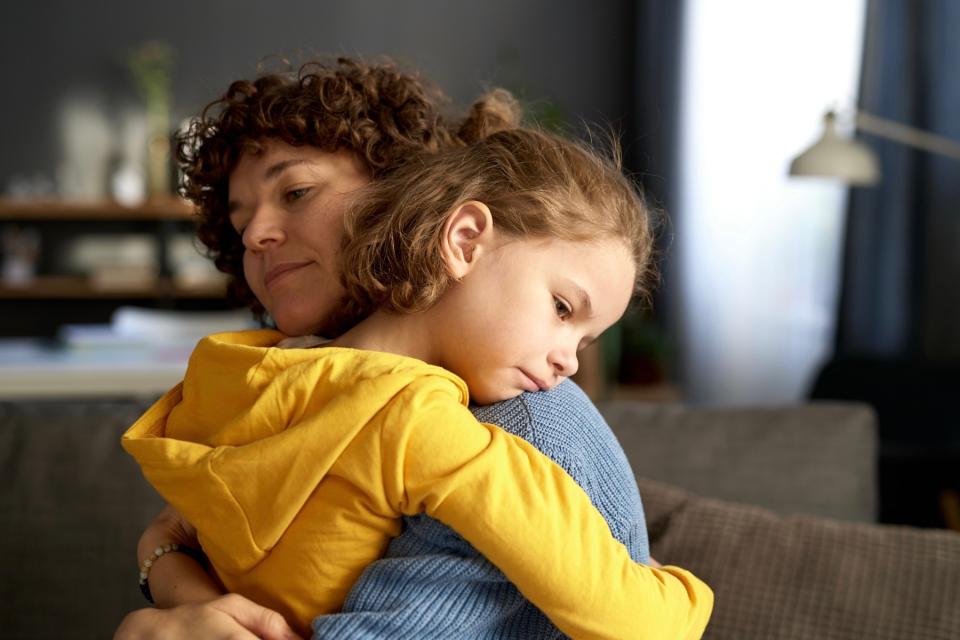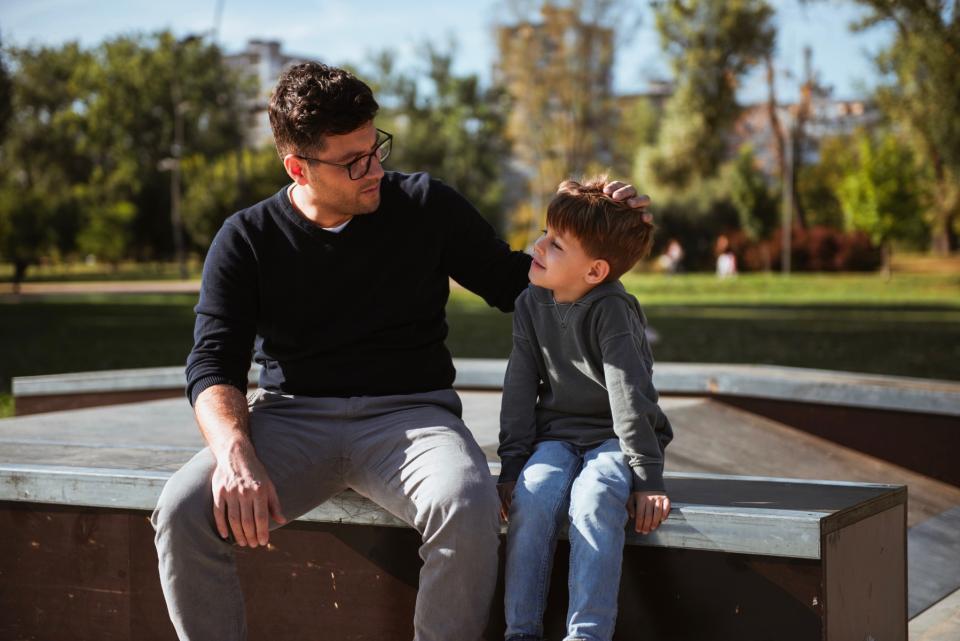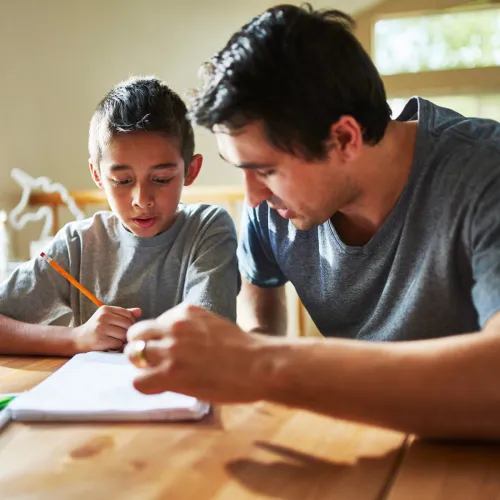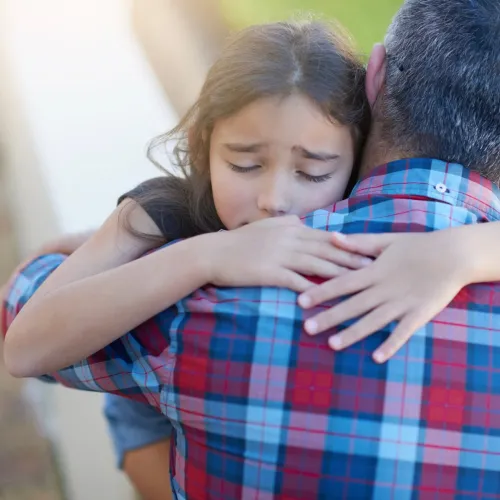Should You Be Honest With Your Kid About Your Co-Parent’s Negative Behaviors?

It can be difficult to decide whether you should be honest with your child about your co-parent’s negative behaviors. But clear guidance can help you navigate your specific situation.
We developed this article with input from three professionals—a family therapist, a family therapist + parenting coordinator, and a family law attorney + former social worker.
We also surveyed over 500 real co-parents through our newsletter and asked them this question: “How do you talk with your kids about your co-parent’s behavior?” Some of their responses are included here (in italics).
In a typical situation, it’s best to be neutral when speaking to your child about their other parent. But it’s usually complicated. Abusive situations require a specific approach, for example, but even situations with different parenting styles can be confusing.
The harmful results of oversharing or criticizing the other parent
Mackenzie Howard, a family therapist, shares the most important thing she tells co-parents: “This other person is this child’s parent. They’re half each of you. However you feel, it doesn’t change the fact that that person is the child’s parent.”
If children feel like their other parent’s character reflects on them, then they are likely to internalize any criticism about that parent. Mackenzie notes that children whose parents overshare show higher rates of:
- Depression
- Anxiety
- Low self-esteem
- Physical or verbal aggression
- Regressive behaviors
- Silence
- Issues between siblings (if they side with different viewpoints)
These situations can also make the child feel like they have to choose between liking one parent or liking the other. In a healthy dynamic, the child should feel free to like both parents.
Oversharing and unnecessary criticism can hurt the child’s relationships with both parents—the one who criticizes and the one who is criticized.
4 questions to ask yourself before criticizing your co-parent to your kid
These questions from Mackenzie can help you quickly decide whether telling the facts would be best for your kid (and for you).
If you suspect a specific issue will eventually arise, think through these questions beforehand. But they also work in the spur of the moment.
1. What’s my motivation in telling my child?
Are you trying to give them insight into their own lives? (A helpful perspective that can comfort and empower your child.)
Or give them coping tools? (Smart parenting for healthy kids.)
Or are you trying to get them on your side? (Unfair to your child, who should have equal opportunities to love both parents.)
2. Does my child need to know this?
Will it help their immediate wellbeing? If it’s about an issue that touches them directly right now, that’s important to address.
For example, if Mom is going for treatment won’t see them for a while, they need to know that she’s gone, and they’ll want some level of explanation. Whereas if Mom cheated, that’s rarely something a child needs to know.
Here’s one parent’s philosophy:
“[I] [m]ake sure if I’m telling them something difficult it’s in age appropriate information and for their own ‘right now’ benefit and not to look like the better parent or get them on my side.” - Co-parent who answered our survey
3. Is my child old enough to hear this?
Consider your child’s age. If a 17-year-old asks why Mom left, you might tell him more than if a 7-year-old asks. Maturity also plays a role. And if they already know something, that plays a role too. A 7-year-old is going to be relatively oblivious, but a 17-year-old may have picked up on some details.
“I share whatever information is age-appropriate and necessary but not any more than that. I make sure to validate their instincts if something is done or said by the co-parent that they feel is amiss.” - Co-parent who answered our survey
Dr. Tara Egan, a family therapist with a doctorate in education, gives an example. “So if a 17-year-old asks you directly whether her mom cheated, you might say, ‘This was definitely an issue in our marriage, but it shouldn’t define how you view your Mom.’
“What if the 17-year-old saw something on Mom’s phone? Should she have to hold on to that secret, for fear her Dad doesn’t know? Say, ‘Your Mom and I will have to work through this, but I want you to focus on your relationship with your Mom.’”
4. Do I have the emotional energy to talk about this?
Of course, your child’s wellbeing should be your main focus—but your wellbeing matters, too. Take a beat, evaluate how you feel, and then remind yourself it’s ok to postpone a bit.
Mackenzie suggests saying, “That’s a bigger conversation, and we don’t have time to talk about it right now. Let’s talk about it after dinner, while you’re getting ready for bed.” That gives you time to process your own feelings so that you don’t respond in anger.
What about when there’s abuse?
If your child is being abused, you can’t brush it under the rug, of course. “It's vital that children and young people are able to speak out,” says the National Society for the Prevention of Cruelty to Children, “and that whoever they tell takes them seriously and acts on what they've been told.”
As one parent explains,
“No kid should see or hear upsetting or frightening things and feel further endangered by an implicit pact of silence. I grew up this way and neither was able to explain behaviors nor felt reassured by anyone that I was safe and there were safe people I could trust. I want my kid to have these resources.” - Co-parent who answered our survey
Here are six steps to follow in these situations, developed using insights from mental health practitioners specializing in families.
(If you aren’t dealing with abuse, jump to the next section.)
1. Validate your child’s experiences and emotions
Acknowledge what happened to your child. If you gloss over it, you could inadvertently gaslight your child, which means making them question their own experience of reality.
“If kids have noticed something is wrong, and I am not honest in an age-appropriate way, my kids are definitely going to catch on to that, and it will compromise my relationship with them. The last thing my children need is two parents gaslighting them.” - Co-parent who answered our survey
(Be mindful of how you react. Even though a dramatic response may seem warranted, your intense reaction could cause your child to feel guilty for getting their other parent in trouble.)
Next, validate your child’s feelings: Tell them their feelings make sense, whether they feel confused, sad, mad, or anything else.
“If keeping quiet on a behavior of his makes me complicit in normalizing his abuse, I speak up.” - Co-parent who answered our survey
Dr. Egan says, “If Dad was acting weird, the kids think it’s because he’s drinking, and you say ‘no, I’m sure that’s not the case’—but the kids know what Dad looks like when he’s drinking, or what Mom looks like when she’s high. Instead, acknowledge what they witnessed or experienced. Then, behind the scenes, you might need to do something to keep your kid safe.”
One parent explains why honesty is important in this situation:
“I found when my child hit a certain age and needed to process information about what was happening at the co-parents house they needed to know they were not “crazy” and needed someone to let them know that behaviors were inappropriate and why using factual information. My child started improving and became open to seeing a therapist, to help as well.” - Co-parent who answered our survey
2. Don’t interrogate your child
Childhelp cautions, “Limit questioning to only the following questions if the child has not already provided you with the information:
- What happened?
- When did it happen?
- Where did it happen?”
3. Make it clear that the abusive behavior was inappropriate
Mackenzie suggests statements like these:
- “Nobody should ever hit you in the face.”
- “Nobody should ever make you feel unsafe with their words.”
- “Nobody should ever threaten you, ever.”
- “I’m sorry this happened to you.”
- “This is not your fault in any way.”
- “I appreciate you telling me—I know that this was hard. I’m proud of you. I want you to tell me anytime that happens because I’m your parent and it’s my job to protect you.”
You can state that your co-parent, specifically, shouldn’t do those things, but you can also expand to make a blanket statement. This can help protect your child against other abusers, as well.
Try saying, “These things shouldn’t happen, ever. If they ever do, let me know. You’ll never get in trouble. Even if it seems silly. If it made you uncomfortable, you should tell me.”
Reaffirm several times that the abuse is not the child’s fault.
4. Don’t say, “Your parent loves you, they just…”
“I always counsel parents to not say that,” says Dr. Egan. “Being screamed at doesn’t feel like love. When the other parent discounts that feeling or justifies that poor behavior as being motivated by love, what about when that kid gets a boyfriend who says, ‘I just love you so much, I can’t help but scream at you’?
“Instead, say, ‘Thank you for telling me how you feel. I always care about how you feel.’”

5. Don’t promise you won’t tell
Instead, suggests Childhelp, explain to your child what is going to happen next (in age-appropriate terms). This can help your child feel like the situation is under control.
6. Emphasize how your home is different
Dr. Egan suggests saying something like, “Thank you for telling me that it felt scary when your dad is yelling at you. I’m going to work really hard to be a good communicator in our house, and if something goes wrong, I’ll use a calm voice.”
7. Get help from all angles
Make a report to CPS. As the Mahoney House explains, “Reporting your concerns is not making an accusation; rather, it is a request for an investigation and assessment to determine if help is needed.” You don’t need to give your name.
Contact your attorney. Find your child a therapist and explain the situation to your child’s school counselor, so they can get help outside the house. If there’s physical abuse, take photos if there are marks, and either way take your child to the hospital. You can also call the police or the Childhelp National Child Abuse Hotline at 1-800-4-A-CHILD (1-800-422-4453).
8. Give your child an action plan for responding to abuse
Ideally, you should find a therapist who can develop a plan for reacting to abuse. But if your child doesn’t already have a therapist, it can take time to get an appointment. It can also take time for CPS and lawyers to get into gear.
Meanwhile, equip your child with a safety plan. For example, Dr. Egan asks, “What happens when you enter the car and your dad smells like beer and there’s an open container? Do you walk back into Target and find an adult? If you have a cell phone, do you need to send a text with a certain symbol?
“Sometimes we have to have an action step for the child to be safe. For example, ‘If mom is mad and throwing things, go crawl under the bed.’”
“My co-parent is a known abuser and alcoholic, and my child needs to be aware of the danger signs. I use factual language only to explain to him what to look for and how he can safely react.” - Co-parent who answered our survey
After all, Dr. Egan points out, we coach young adults for how to handle an unruly customer, or a pushy guy at a bar. We shouldn’t give kids the impression that they don’t deserve safety strategies just to protect their parent’s reputation.
9. Document what your child said
It can help you later if you write down exact quotes from your conversation with your child.
How to talk to your kid when there isn’t abuse
Even without abuse present, the scenarios can get complicated. These strategies apply across a wide variety of situations, but use your best judgment to decide which ones are best for your family.
Address the behavior, not the person
When you talk about the negative actions or poor choices, focus on those—rather than making blanket statements about your co-parent as a person.
“I always focus on the behavior and not that he is a bad person. It’s important my kids know it’s not ok to treat others poorly and it’s a choice.” - Co-parent who answered our survey
“Point out the behavior,” recommends Dr. Egan, “rather than framing them as a person with poor character. Try saying, ‘It frustrates me that you come back from being at your Mom’s house with 10 missing assignments. I wish you would focus on that when you are with her’—versus, ‘Your mom doesn’t care about education, she’s kind of an idiot, and you’ll never learn to be a smart person with her.’
“Don’t make global statements about the person’s character.”

Stay neutral when appropriate
If your child asks you why you broke up with your former spouse, there are so many ways to answer. A healthy answer, explains Mackenzie, might sound like this: “Your Mom and I love you, but we aren’t able to be together. But that’s never going to change how we feel about you.”
An unhealthy answer might sound like this: “Your horrible Mom cheated on me.”
Stick to the end results, not the gory details. In other words, “Read a summary, not the whole chapter.”
Make a distinction between personal values and safety
“Two people can have different values about the children’s wellbeing that can be valid but different,” explains Dr. Egan. For example, if one parent is Catholic and one is atheist, or if one values good grades while the other parent values success in sports, they could both be good parents, even though their values differ.
Those situations are different from ones that put your child at direct risk of harm—like a parent allowing a 13-year-old to drink alcohol at a neighborhood BBQ. If it’s a safety issue, not a personal belief, address it head on. Dr. Egan suggests a response like this: “That is not a good choice. I feel like it’s dangerous, and it’s really important for you to know that’s not acceptable behavior. I’m going to talk to your dad.”
Set boundaries for what you won’t talk about
“A lot of kids are very pushy,” notes Mackenzie. “They want to know what’s going on. About middle school age, they feel developmentally like they’re older—'I can handle it, I want to know what’s going on’—a lot of times, they won’t let up.
“That’s time for the parent to insert a boundary. ‘I’ve told you as much as I’ve told you—you don’t have to agree that I shouldn’t tell you more. As a parent, I’m telling you, this is as much information as you need to know.”
“I used to try to shield them more, but my daughter asked me to please be more honest about what’s going on behind the scenes because she was only hearing half the story from the other parent. I try to let her lead me to what is the right amount of detail to share, and if it gets to a point where I would rather not answer her questions, I ask her if it’s okay not talk about that because maybe that’s a side of her other parent I would rather she not see. She usually leaves things there.” - Co-parent who answered our survey
Other ways to help your child and protect yourself
The following strategies apply whether there’s abuse or not. They should make a difficult situation a little easier.
Help your child set their own boundaries with their other parent
“Especially with my older, adolescent clients,” says Mackenzie, “I try to encourage them to set their own boundaries with their parents. A lot of times, depending on what has happened, parents will confide in their kids.
“Setting a boundary and saying, ‘Dad, I can’t be the one you talk to about how frustrated you are with Mom. I can’t be that person. Maybe you should get a therapist, or maybe you should talk about it with your best friend. That’s my Mom, and it’s really hard to hear you talk badly about her.’” Mackenzie explains, “This can help kids feel empowered in a situation where they feel really powerless.”
“It’s a hard balance but my son has seen enough that he has brought up the unhealthy behavior to me on his own. We talk openly about boundaries and how to handle these situations, he will need to know how to navigate for all the relationships in his life.” - Co-parent who answered our survey
Vent to someone safe
Divorce or separation usually come with a lot of complicated, sad, and/or angry emotions—and it’s hard to make sure those frustrations don’t spill out at the wrong time (e.g., towards your kids).
So vent safely, to someone else: a friend, a parent, a therapist. Or check out these healthy alternatives to venting.
Make sure your kids don’t overhear your venting—keep it outside the home or at times when you’re not with them.

When necessary, speak to your attorney
“If the co-parent is badmouthing them more than once in a while,” says Danielle Kestnbaum, family law attorney and former social worker, “I would say it warrants talking to your attorney, as it likely violates the parenting agreement or order and might be worth considering if it is egregious enough to file a contempt petition or take other legal action.”
Talking to your attorney can help you explore your options, “Like agreeing or being ordered to communicate exclusively via OurFamilyWizard, where all communication is documented and can be retrieved as needed.”
The court may also order the badmouthing parent to attend therapy, or it may limit that parent’s parenting time or appoint a guardian ad litem.
Protect your child from overwhelm, oversharing, and gaslighting
There’s no black-and-white answer. Sometimes, the right thing is telling your child the frank truth. Other times, it’s shielding your child from truths they don’t need to know. Usually, it’s somewhere in the middle.
If you’re keeping your child’s wellbeing in mind—and you take care of yourself, too—then you’re on the right track.



